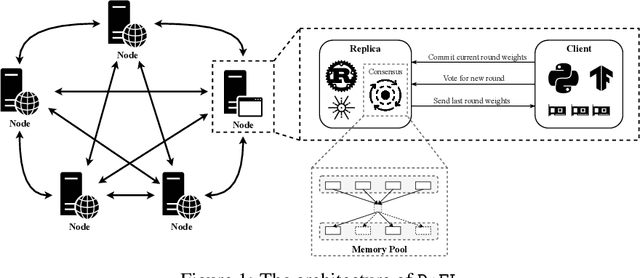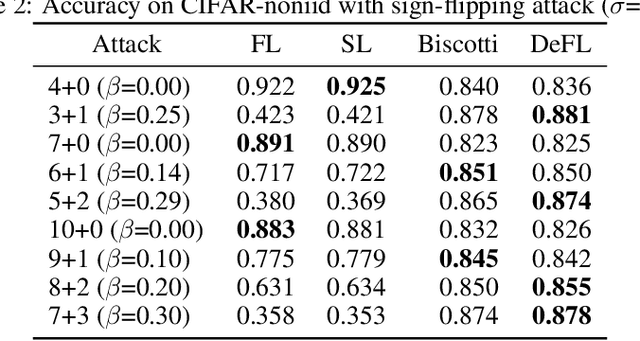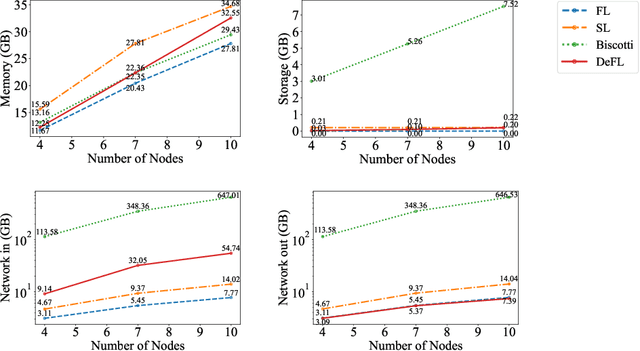Jialiang Han
DeFL: Decentralized Weight Aggregation for Cross-silo Federated Learning
Aug 01, 2022



Abstract:Federated learning (FL) is an emerging promising paradigm of privacy-preserving machine learning (ML). An important type of FL is cross-silo FL, which enables a small scale of organizations to cooperatively train a shared model by keeping confidential data locally and aggregating weights on a central parameter server. However, the central server may be vulnerable to malicious attacks or software failures in practice. To address this issue, in this paper, we propose DeFL, a novel decentralized weight aggregation framework for cross-silo FL. DeFL eliminates the central server by aggregating weights on each participating node and weights of only the current training round are maintained and synchronized among all nodes. We use Multi-Krum to enable aggregating correct weights from honest nodes and use HotStuff to ensure the consistency of the training round number and weights among all nodes. Besides, we theoretically analyze the Byzantine fault tolerance, convergence, and complexity of DeFL. We conduct extensive experiments over two widely-adopted public datasets, i.e. CIFAR-10 and Sentiment140, to evaluate the performance of DeFL. Results show that DeFL defends against common threat models with minimal accuracy loss, and achieves up to 100x reduction in storage overhead and up to 12x reduction in network overhead, compared to state-of-the-art decentralized FL approaches.
Demystifying Swarm Learning: A New Paradigm of Blockchain-based Decentralized Federated Learning
Jan 17, 2022



Abstract:Federated learning (FL) is an emerging promising privacy-preserving machine learning paradigm and has raised more and more attention from researchers and developers. FL keeps users' private data on devices and exchanges the gradients of local models to cooperatively train a shared Deep Learning (DL) model on central custodians. However, the security and fault tolerance of FL have been increasingly discussed, because its central custodian mechanism or star-shaped architecture can be vulnerable to malicious attacks or software failures. To address these problems, Swarm Learning (SL) introduces a permissioned blockchain to securely onboard members and dynamically elect the leader, which allows performing DL in an extremely decentralized manner. Compared with tremendous attention to SL, there are few empirical studies on SL or blockchain-based decentralized FL, which provide comprehensive knowledge of best practices and precautions of deploying SL in real-world scenarios. Therefore, we conduct the first comprehensive study of SL to date, to fill the knowledge gap between SL deployment and developers, as far as we are concerned. In this paper, we conduct various experiments on 3 public datasets of 5 research questions, present interesting findings, quantitatively analyze the reasons behind these findings, and provide developers and researchers with practical suggestions. The findings have evidenced that SL is supposed to be suitable for most application scenarios, no matter whether the dataset is balanced, polluted, or biased over irrelevant features.
$C^3DRec$: Cloud-Client Cooperative Deep Learning for Temporal Recommendation in the Post-GDPR Era
Jan 13, 2021



Abstract:Mobile devices enable users to retrieve information at any time and any place. Considering the occasional requirements and fragmentation usage pattern of mobile users, temporal recommendation techniques are proposed to improve the efficiency of information retrieval on mobile devices by means of accurately recommending items via learning temporal interests with short-term user interaction behaviors. However, the enforcement of privacy-preserving laws and regulations, such as GDPR, may overshadow the successful practice of temporal recommendation. The reason is that state-of-the-art recommendation systems require to gather and process the user data in centralized servers but the interaction behaviors data used for temporal recommendation are usually non-transactional data that are not allowed to gather without the explicit permission of users according to GDPR. As a result, if users do not permit services to gather their interaction behaviors data, the temporal recommendation fails to work. To realize the temporal recommendation in the post-GDPR era, this paper proposes $C^3DRec$, a cloud-client cooperative deep learning framework of mining interaction behaviors for recommendation while preserving user privacy. $C^3DRec$ constructs a global recommendation model on centralized servers using data collected before GDPR and fine-tunes the model directly on individual local devices using data collected after GDPR. We design two modes to accomplish the recommendation, i.e. pull mode where candidate items are pulled down onto the devices and fed into the local model to get recommended items, and push mode where the output of the local model is pushed onto the server and combined with candidate items to get recommended ones. Evaluation results show that $C^3DRec$ achieves comparable recommendation accuracy to the centralized approaches, with minimal privacy concern.
 Add to Chrome
Add to Chrome Add to Firefox
Add to Firefox Add to Edge
Add to Edge